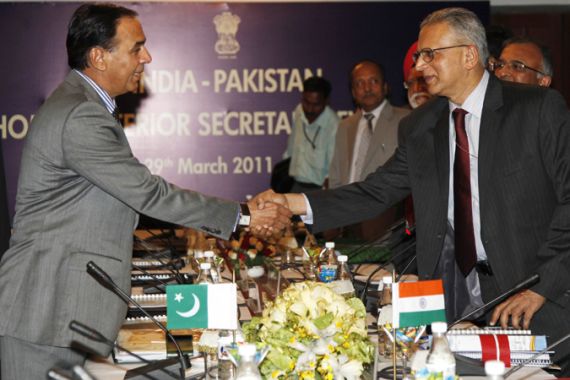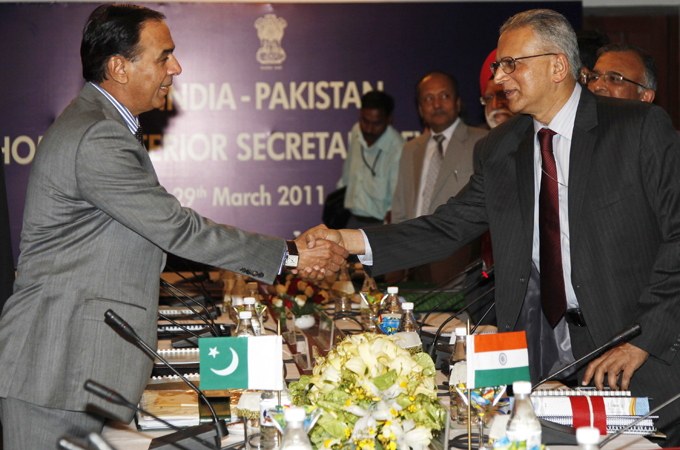India-Pakistan talks resume ahead of match
Upcoming World Cup cricket game overshadows first talks between the two nuclear rivals since the 2008 Mumbai attacks.

 |
| Chaudhary Zaman (L), Pakistani home secretary, meets his Indian counterpart, GK Pillai (R), in New Delhi [Reuters] |
India and Pakistan have begun their first formal peace talks since the 2008 Mumbai attacks, in a meeting that comes ahead of a seminal World Cup cricket match between the two countries.
Top officials from both nations met in the Indian capital New Delhi on Monday in a bid to repair relations between the nuclear rivals. Ties were broken off after 166 people were killed in a three-day shooting spree in Mumbai, which India has blamed on Pakistan-based fighters.
The talks are due to end on Tuesday, but the focus has already turned to Wednesday’s World Cup cricket semi-final between the two old rivals after Manmohan Singh, the Indian prime minister, invited Yousuf Raza Gilani, the Pakistani prime minister, to the game.
Monday’s talks were expected to prepare the groundwork for a ministerial meeting in July that would put issues like Kashmir, terrorism and trade on the negotiating table in what is known as the “composite dialogue”.
The two countries, which have fought three wars since their independence from British rule in 1947, agreed in February to resume formal peace talks.
In a goodwill gesture ahead of the cricket match, Asif Ali Zardari, Pakistan’s president, will also free an Indian national, Gopal Das, who has been in a Pakistani prison for 27 years as an alleged spy.
Low expectations
However, some Pakistanis are said to be sceptical that Singh is simply playing to his domestic audience and trying to distract from a string of corruption scandals that have effectively paralysed the Congress-led government.
“If the Indians have invited the prime minister and the president, there is no harm in going there, because this is a gesture,” said Ejaz Haider, a Pakistani political analyst and contributing editor for Friday Times.
“But this gesture in itself is not going to result in any breakthrough in substantial terms.”
Many Pakistanis also see little chance that the ruling Congress party is really interested in making peace overtures.
It is a risky issue for any Indian leader, one that wins few votes and would quickly backfire if there was another attack in India blamed on Pakistan.
India, for its part, has always been sceptical about peace talks with civilian leaders in Pakistan, who are overshadowed by a powerful military intelligence service and army.
But there may be new political winds blowing as the 78-year Singh, who was born in Pakistan before moving to India after partition in 1947, could secure his political legacy if he achieves peace with Pakistan.
Singh is threatened by months of corruption scams that have led the opposition to call for his resignation.
Pakistan is also facing an increasingly difficult regional environment as India’s grows in influence with its traditional ally, the US.